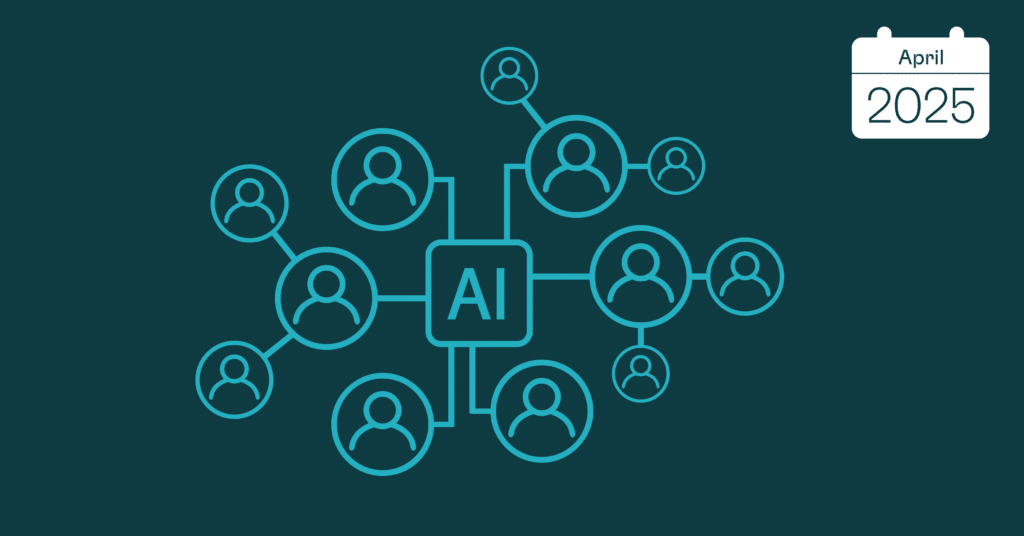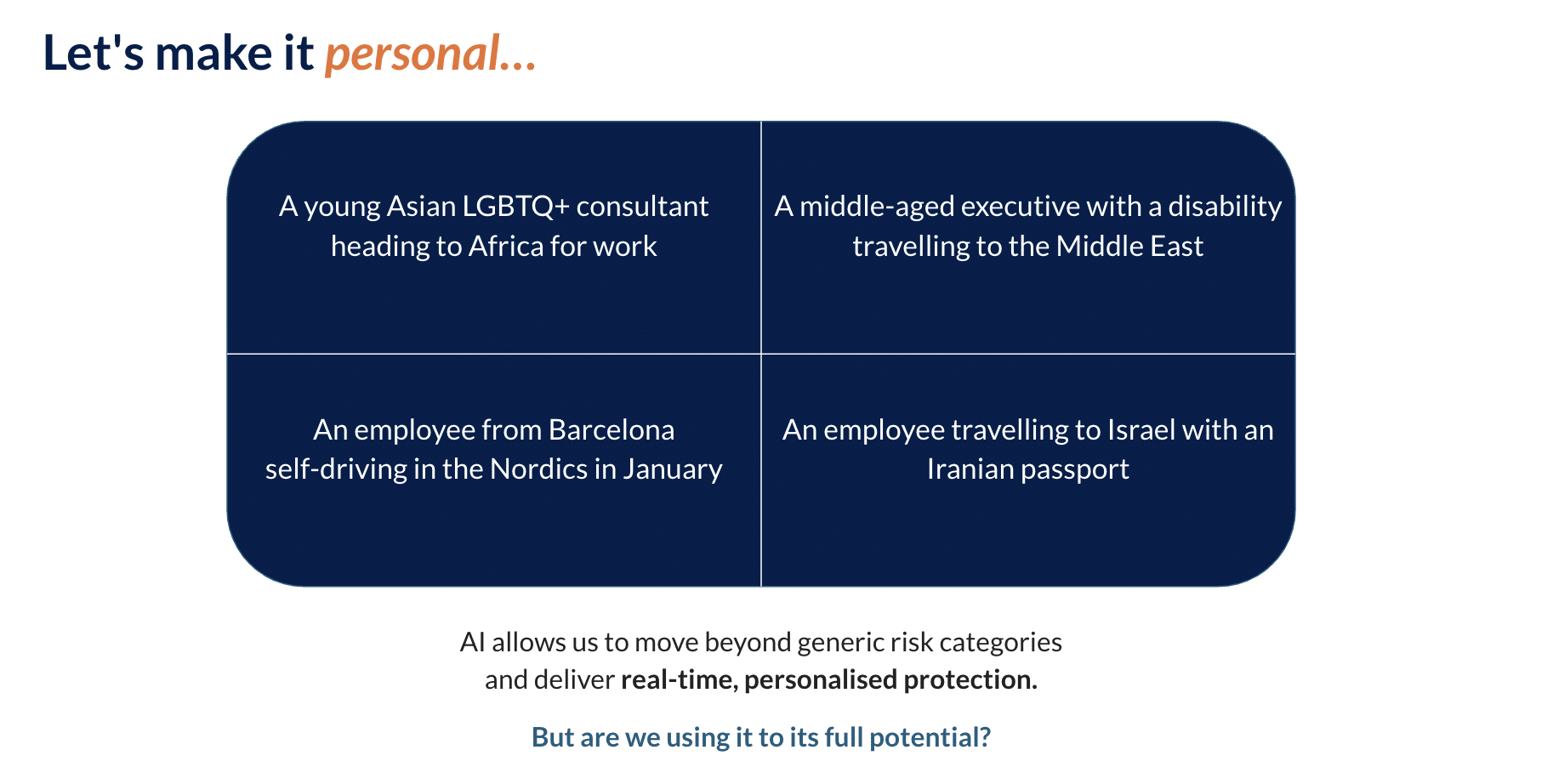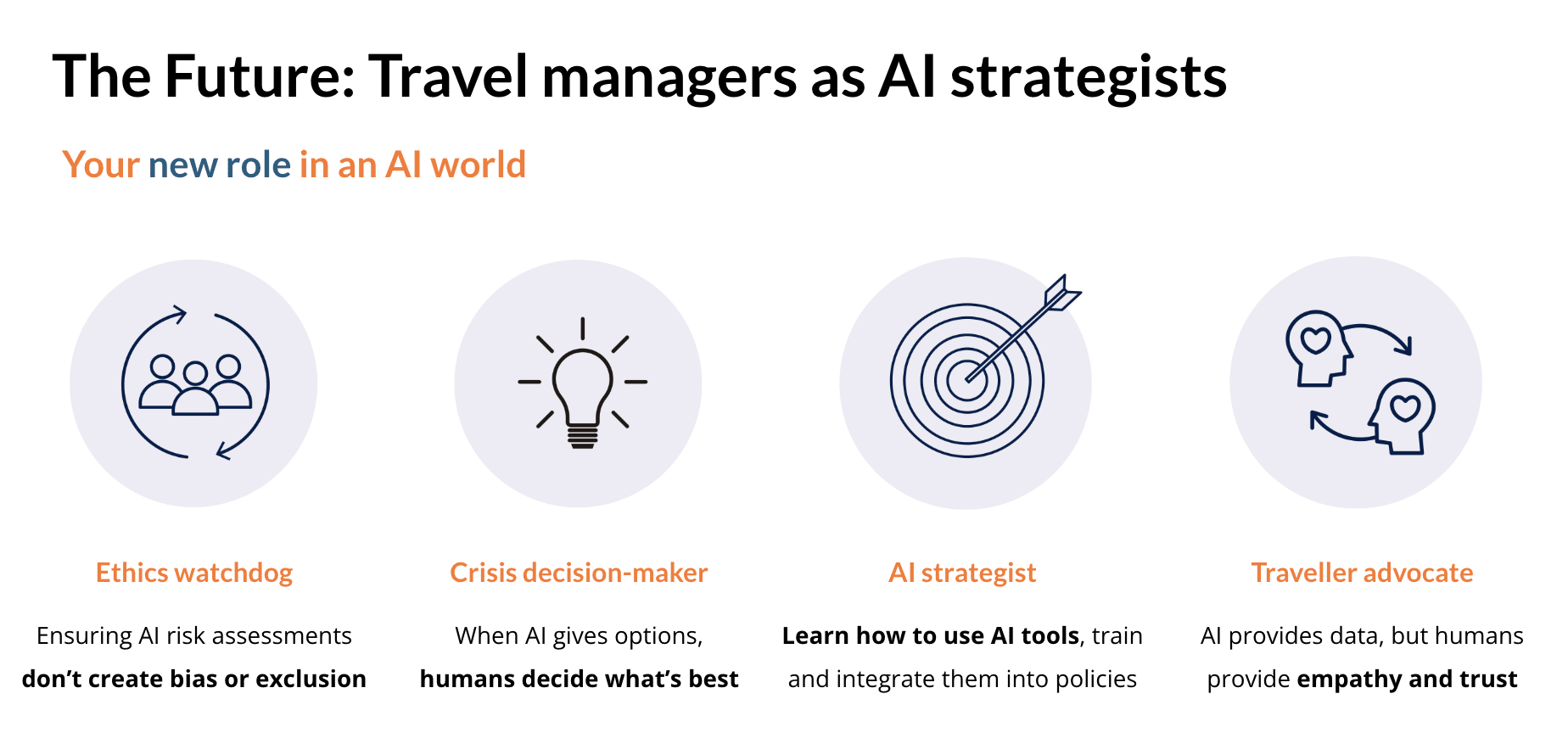With contributions by Claudia Gualdi and Suzanne Sangiovese
This is a summary of the session “Leveraging AI and Personalised Solutions for Diverse Traveller Risk Profiles” at the Nordic Business Travel Summit 2025 (NBTS) in March. Suzanne Sangiovese, CEO of Riskline, shared valuable insights on the role of AI in shaping the future of travel risk management.
Are We Prepared for the Unthinkable?
Every day, we encounter headlines about crises unfolding across the globe. For years, travel risk management has focused on the concept of ‘vulnerable destinations’. But what happens when the next crisis doesn’t align with our existing models? What if a cyberattack grounds all flights across Europe? What if travellers find themselves caught in a riot in Paris?
The world is constantly shifting, and the landscape of risk is being redrawn. The question is: are we ready for this new reality?
The Changing Face of Travel Risk Management
With tightening border controls and rising security challenges, AI is revolutionising the approach to travel safety. Traditional travel risk management has historically focused on common disruptions such as illness, accidents and flight cancellations. Yet today’s security concerns require a more sophisticated and personalised approach, leveraging artificial intelligence.
AI can analyse global risk factors in realtime, detect individual vulnerabilities based on a traveller’s unique profile, and dynamically adjust safety protocols accordingly. For example, the vulnerabilities faced by a solo female executive travelling to Dubai are quite different from those encountered by an LGBTQ journalist heading to Russia. Security concerns are inherently personal, and AI must account for these variations to provide meaningful protection.
Understanding Diverse Traveller Risk Profiles
Most risk models assume a ‘generic’ profile, a businessperson or a tourist, for example, but real travellers are far more complex. They are individuals with unique circumstances. Their risks cannot be simplified into broad categories. For instance, a young Asian LGBTQ consultant on assignment in Africa may face social and legal risks that predictive systems can identify. Similarly, a middle-aged executive with a disability heading to the Middle East may require AI-driven medical access mapping and emergency support. Furthermore, an employee visiting Israel with an Iranian passport could encounter visa issues, entry bans and increased scrutiny from local authorities.
AI in Realtime Risk Management
Imagine a world where travel risk management is not just reactive but predictive. A world where technology identifies potential hazards before they escalate. Instead of hearing about an attack in London after it happens, imagine being informed in realtime about a protest near your hotel, or having your itinerary adjusted in advance due to signs of impending unrest.
This is not sci-fi; this is the future of AI-driven travel risk management, and it is coming faster than we think. Intelligent risk solutions are set to revolutionise it by tailoring alerts based on the user’s identity and surroundings, such as their gender, profession or location in a highly insecure zone. It can assess political instability at a destination and send encrypted alerts for travellers in restrictive countries.
In response to threats, it can adjust itineraries, rebook flights or relocate hotel reservations before a cyberattack shuts down an airport. Artificial intelligence also acts as a 24/7 safety assistant, guiding through emergencies with augmented reality, disabling geolocation tracking in civil unrest or securing identities and issuing digital credentials for stolen passports.
The AI-Human Balance: Where Do Travel Managers Fit In?
As AI continues to take on more of the heavy lifting in travel safety, it raises the question: where do travel managers fit into this new landscape? While artificial intelligence excels in processing large volumes of data, predicting disruptions and delivering personalised updates in realtime, it is still unable to fully replicate the nuances of human decision-making.
Artificial intelligence can process millions of risk factors in an instant and adjust itineraries automatically, but it cannot understand human emotions or cultural sensitivities. It cannot navigate ethical dilemmas nor can it make decisions about what constitutes ‘safety’ for an individual traveller based on their personal values and experiences. These are areas where human input remains crucial.
Rather than replacing travel managers, intelligent risk solutions are redefining their roles. Travel managers will no longer be solely responsible for managing threats; instead, they will act as AI strategists, ensuring that AI systems are trained, refined and integrated effectively into TRM programmes. They will also serve as ethical watchdogs, making sure that it doesn’t introduce biases or exclusions into the system. Additionally, travel managers will remain crisis decision-makers, stepping in to choose the best course of action when tools present multiple options. Above all, travel managers will continue to advocate for travellers, providing the human empathy and trust that smart technology cannot replicate.
Transforming Travel Risk Management for the Future
AI is not just a tool—it’s a transformative force that is reshaping how we think about and manage travel safety. The days of responding to crises after they occur are over. With AI’s predictive capabilities, we have the power to anticipate threats, adjust plans proactively and provide tailored safety solutions. This is the next frontier in risk management—where technology doesn’t simply react, but anticipates and prevents.
However, technology alone is not enough. The companies that will lead the future of corporate travel are those that embrace AI-driven, predictive risk management systems. They will be the ones who foresee and mitigate threats before they disrupt travel plans, giving them a distinct competitive edge in an increasingly uncertain world. Those who fail to adapt will find themselves forever playing catch-up, reacting to crises instead of preventing them.
The reality is clear: Artificial intelligence is here, and it has the potential to revolutionise how we protect travellers. The question is: If AI could tell you the future, would you listen?


